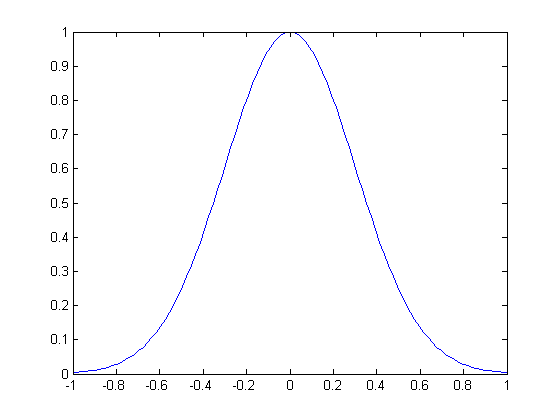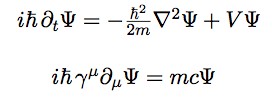Physicist: In a word; nope.
The Heisenberg Uncertainty Principle is a statement about how “certain” some combinations of quantities can be. The most commonly referenced is the “position and velocity” version of the Uncertainty Principle, that says that the more exact the position of a thing (any thing) the less certain its velocity, and vice versa. It’s basically because of the Uncertainty Principle that you’ll hear about how quantum mechanics predicts that “particles have some small chance of jumping across the universe (position uncertainty)”, or “there’s some possibility that all the atoms in a book will suddenly start moving and it’ll jump off the shelf (velocity uncertainty)”.
And in fact, if you apply Schrödinger’s equation directly (which essentially describes how quantum wave functions change with time), it does seem as through there should be no problems with things suddenly jumping around. If you apply it directly you find that if you have a particle confined to a particular region, then any amount of time later there’s some chance (no big) that it can be anywhere else, which is pretty exciting. Unfortunately, Schrödinger’s equation is an approximation in very much the same way that Newton’s equations of motion are approximations of the (correct) relativistic equations of motion.

Soon after a particle’s position has been measured to be near zero, the wave function of a particle (which describes the probability of it being found at that position) tends to spread out like this, getting wider and wider as time goes on. According to Schrödinger’s equation the tails on both sides approach, but never quite reach, zero.
Schrödinger’s equation was a massive break through and provided a lot of insight into a lot of problems. But despite that, it doesn’t work perfectly. In general, if you have a theory and it doesn’t line up perfectly with special relativity, then you only have part of a theory. The fact that Schrödinger’s equation is “non-relativistic”, as evidenced by the fact that it predicts that sometimes particles will blink from place to place faster than light, made a lot of physicists extremely nervous. It took a couple more years (1926-1928) until Dirac fixed the problem with the Dirac equation, which is more or less the same, but adheres to relativity.

The Schrodinger Equation (top) and the Dirac equation (bottom). The Dirac equation takes into account relativity. Heck, it’s even got a “c” for light speed in there.
Newton’s equations of motion are very accurate, but only up until they disagree with relativity. For example, they imply that there’s nothing special about light speed, and you can totally go faster. Similarly, Schrödinger’s equation is remarkably accurate in most day-to-day, electron-shell type calculations, but makes big mistakes when relativity needs to be taken into account.
Long story short, even when considering the Uncertainty Principle, nothing can ever end up someplace else that would normally require faster than light travel.
As for books suddenly jumping off of shelves; the universe according to the laws of quantum mechanics is a seriously weird place. But ultimately, laws are laws. In this case, the conservation of momentum and energy.
If you take the predictions of quantum mechanics at face value (and why not?), everything that can happen does (in a very specific, many-worlds, sense). But that “can” is pretty iron-clad. Something that’s possible, even if it’s very unlikely, will happen in one some versions of the world*, but a book (or any other object) suddenly moving involves some extra energy suddenly being added to the universe, which is no good.
So, winning the lottery 75 times in a row, while making blind free throws for a couple weeks: sure. Books jumping off of shelves: ridiculous.
* “World” is definitely not the right word for this, because it evokes images of other dimensions à la Sliders and leads to general confusion. Neil Stephenson uses “narrative” which seems like as good a word as any, and hits a little closer to the mark.







29 Responses to Q: Does quantum mechanics really say that there’s some probability that objects will suddenly start moving or that things can suddenly “shift” to the other side of the universe?